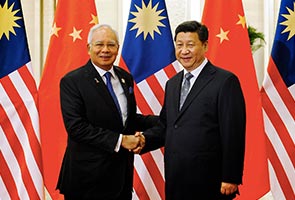Malaysia’s economic growth is based largely on trade with the rest of the world. It is the same formula that made Great Britain, the United States, and now China world economic powers. That approach is paying off, as seen in the high-level meetings between He Guoqiang, a senior official with the Chinese Communist Party, and Prime Minister Datuk Seri Najib Razak and Deputy Prime Minister Tan Sri Muhyididn Yassin.
With China’s incredible economic growth cooling amid internal warning signs of inflation and overbuilding, Europe on the verge of an enormous economic crackup, and the United States slowing or possibly slipping back into recession again, the global economic headwinds are formidable.
The Government’s aggressive programme of courting foreign direct investment and opening foreign markets to Malaysian trade is intended to help our economy pass by those headwinds.
China is of course the second largest economy in the world, and expanding trade with this regional power is rooted in common sense. However, it is to the Government’s credit that the expansion is not merely an attempt to match China’s low-quality goods production, but rather an attempt to identify comparative advantages for both sides, and to trade for them.
Thus, while Malaysia courts China’s expertise in infrastructure development — ironically, China grew so good at this that it may have contributed to their current malaise — opportunities to market halal food in China’s numerous Muslim markets, including Xin Jiang and Ning Xia, are open for Malaysia.
This is not merely a story of bilateral trade ties. It is a story of increasing regional integration, of cooperation and the triumph of the idea that moderation and dialogue can create a better world than can conflict and misunderstanding.
This is an idea that Najib has made the centre piece of his tenure as Prime Minister, an idea he set forth most fully in a speech last year – and the idea that, at its core, infuses both his foreign policy and his 1Malaysia programme.
He is believes in the idea that calm, deliberation, harmony, and a determination to trade and grow together can overcome any gaps, whether between races and political parties in Malaysia or between nations with competing claims on sea lanes and island chains.
He is not the first world leader to internalise the idea that trade can bring nations together; he is arguably the first to advance that idea at every level of governance. Increased trade with China, Najib has explicitly argued, is but one of many interlocking pieces that keeps Beijing peacefully engaged with Asean, and then East Asia with the rest of the continent, and the continent with the world.
The bold scope of this undertaking lies behind the new trade ties and trade deals, news of new bilateral agreements and foreign direct investment, and all of the small things that make up the mundane parts of commerce. It is an impressive project: that peace and harmony, and not dislocation and turmoil, will follow as nations grow together.
Najib’s approach is delivering results. Malaysia’s growth continues at a rate most of the world would envy, in the face of what looks increasingly like a global depression, or at least a prolonged and painful recession.
Our economy is developing self-sustaining internal demand, one of the critical components of escaping the ‘middle income trap.’ It is largely thanks to this programme and concept that Barisan Nasional remains the odds-on favourite to form the government after GE13.
But it is still a gamble, one the Opposition would happily try ending, and one even some members of Najib’s ruling coalition would like to see fail if they could.
With every trade deal and good economic news, Najib’s approach is further justified. And Malaysia moves one step closer on its road to development.

